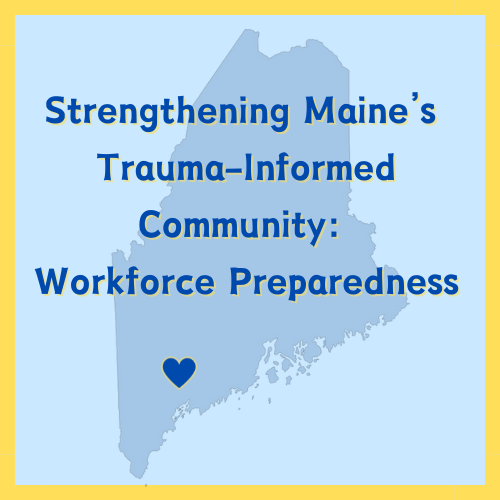Description
July 11, 2024, 8:30am-4:00pm & July 12, 2024, 8:30am-12:00pm
Maine Resiliency Center | Lewiston, ME
This training is intended for Maine clinicians working with individual clients. Clinicians who have worked with victims or persons affected by the mass violence event in Lewiston will be prioritized.
Description:
Cognitive Behavior Therapy for Post-disaster Distress (CBT-PD) is a time-limited, transdiagnostic approach to treating problematic symptoms following exposure to a disaster that can threaten functioning, well-being, and overall quality of life. The CBT-PD program is a flexible but structured approach that involves teaching a broad range of information and strategies for facilitating recovery from a disaster, including psychoeducation about the nature of post-traumatic reactions to disaster, relaxation techniques for reducing anxiety and physiological over-arousal, and activity scheduling to re-engage people in enjoyable and meaningful activities in order to combat depression and avoidance. The majority of the program focuses on teaching cognitive restructuring as a strategy for dealing with negative feelings that often occur following a disaster. Cognitive restructuring is a skill that involves learning how to recognize and critically evaluate thoughts and beliefs that accompany one’s negative feelings, and how to change them when they are inaccurate.
Evidence for CBT-PD
Over twenty years of clinical experience and research support the effectiveness of the CBT-PD program for helping people overcome the effects of a disaster on their lives. Implementation of the CBT-PD program has been supported by SAMHSA, which has involved the training of hundreds of community-based clinicians. The program has been used successfully to help thousands of survivors overcome and recover from the devastating effects of a broad range of disasters, such as the September 11th 2001 terrorist attacks, Hurricane Katrina in 2005, the Boston Marathon Bombing in 2013 and other hurricanes, floods, wildfires, and mass shootings.Any adult (or adolescent aged 16 or older) with moderate or severe post-disaster distress can benefit from the CBT-PD program. The program is usually provided for 12-14 individual weekly therapy sessions over a 3-6 month, beginning as soon as the immediate threat and disruption of the disaster has ended. The program can also be provided after a more extended period following the disaster, such as 6-12 months or more after the disaster.
Objectives:
Participants in this workshop will receive specific instruction in the CBT-PD therapy program. Clinical considerations in the application of this therapy to recent floods and covid-related stress are discussed.
At the completion of this program the participant will:
• Be familiar with current literature on the mental health effects of disaster.
• Understand the rationale for CBT-PD
• Be able to use the CBT-PD program with their clients
Presenter:
 Jessica L. Hamblen, PhD, is a clinical psychologist and Associate Professor in the Department of Psychiatry at the Geisel School of Medicine at Dartmouth. She is also the Deputy for Education at the Department of Veterans Affairs’ National Center for PTSD. Her research interests are in developing, evaluating, and disseminating evidence-based treatments for PTSD and in finding ways of improving patient engagement in those treatments. She has a national reputation as an expert in the long-term mental health response following disaster. She has served as a member of state and national disaster panels, including the Substance Abuse and Mental Health Services Administration (SAMHSA) Disaster Behavioral Health Expert Panel in 2018, and has presented her work at numerous national and international meetings. She is the lead developer of Cognitive Behavioral Therapy for Postdisaster Distress (CBT-PD) program and co-author of the forthcoming book: Treatment for Postdisaster Distress: A transdiagnostic approach.
Jessica L. Hamblen, PhD, is a clinical psychologist and Associate Professor in the Department of Psychiatry at the Geisel School of Medicine at Dartmouth. She is also the Deputy for Education at the Department of Veterans Affairs’ National Center for PTSD. Her research interests are in developing, evaluating, and disseminating evidence-based treatments for PTSD and in finding ways of improving patient engagement in those treatments. She has a national reputation as an expert in the long-term mental health response following disaster. She has served as a member of state and national disaster panels, including the Substance Abuse and Mental Health Services Administration (SAMHSA) Disaster Behavioral Health Expert Panel in 2018, and has presented her work at numerous national and international meetings. She is the lead developer of Cognitive Behavioral Therapy for Postdisaster Distress (CBT-PD) program and co-author of the forthcoming book: Treatment for Postdisaster Distress: A transdiagnostic approach.
Contact hours:
10 contact hours for social workers, licensed clinical professional counselors, and behavioral health professionals
10 category I contact hours for psychologists. CCSME is a pre-approved sponsor and provider of Professional Education Activities for Psychologists.
10 contact hours for Alcohol and Drug Counselors pending approval from the Maine Board of Alcohol and Drug Counselors.
10 contact hours for CHES. CCSME is a designated provider of continuing education contact hours (CECH) in health education by the National Commission for Health Education Credentialing, Inc.
Financial support is available to clinician participants with billable hours. Please contact Casey at ccoddaire@ccsme.org once you have registered if you would like to accept this financial support.
To request accommodations, please contact Casey at ccoddaire@ccsme.org.
Attendees are required to be present for 100% of all training sessions and complete the course evaluation in order to receive a certificate. Partial credit will not be awarded.
This training is supported by grant number 1H07SM089706-01 from the Substance Abuse and Mental Health Services Administration (SAMHSA). The content of this publication does not necessarily reflect the views or polices of SAMHSA or the U.S. Department of Health and Human Services (HHS).




